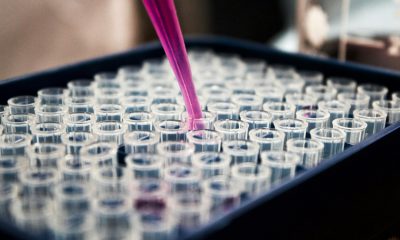Biotech
Cornea Project opens financing round and creates a subsidiary to reach the US
The Spanish company Cornea Project, specialized in ocular pathologies, has already started Phase II of the project to decide the chemistry and algorithms to be added to its medical device. Currently, the biotech company has opened a financing round of $830,000 (€700,000) through the crowdfunding platform Capital Cell, and has created a subsidiary to expand to the United States.

Cornea Project is knocking on the door of private investors. The Spanish company, specialized in ocular pathologies, has opened a financing round of $830,000 (€700,000) through the crowdfunding platform Capital Cell. At the same time, the company has created a subsidiary to expand its commercial activity in the United States.
The company was created with the aim of developing a platform capable of diagnosing ocular pathologies through biomarkers at an early stage of the disease and thus avoid blindness and low vision. The first objective of the Cornea Project is to address the difficulty of detecting subclinical keratoconus.
The company has a patent that protects the only two biomarkers that detect keratoconus at an early stage, with a sensitivity and specificity above 90%, having protected the markers and obtained the patent in Europe and the United States.
Read more about the plans the company Cornea project has and find the latest business headlines of the day with the Born2Invest mobile app.
Cornea Project has the patent that protects the only two biomarkers that detect keratoconus
The first diagnosis will be keratoconus, the second cause of corneal transplantation worldwide and the first cause of complications in refractive surgery, thanks to its two patented biomarkers. It is estimated that more than 200 million people worldwide suffer from visual problems due to ocular pathologies such as glaucoma, keratoconus or age-related macular degeneration. More than thirty million people are declared legally blind. A disease unknown by many, but which is the second cause of corneal transplant in the world, keratoconus is a serious complication if not diagnosed prior to refractive surgery to treat myopia, hyperopia or astigmatism.
Currently, the company has already started Phase II of the project to decide the chemistry and algorithms to be added to the device. All that remains is to start the development of the diagnostic platform at the point of care (POC) in order to obtain the prototype within one year.
The company has constituted the subsidiary PreVista Diagnostic to focus its business strategy in the United States
The company’s market strategy is to initiate the launch of its product in the United States. To this end, the company has already set up the PreVista Diagnostic subsidiary to carry out the clinical trials in Harvard, Boston and to start the entire marketing and communication campaign from there and then expand it to Asia and Europe. The company’s founding partner and CEO is Pere del Campo, an optometrist and entrepreneur.
For years, Del Campo worked as an expert in keratoconus and refractive surgery, being a consultant or responsible for business development for companies such as Ferrara Rings, Mediphacos or Imex Clinic. Sigfrid Borràs is also a founding partner and the financial director. Borràs is an entrepreneur with experience in the refractive surgery market, especially in sales, introducing the lasers for refractive surgery in the European market. He has been commercial director of B&L Ibérica and general director of Imex and Hoya Iberia. Among the company’s advisors is Josep Lluis Falcó, founder and CEO of Genesis Biomed, a consulting firm specializing in the biomedical sector. This company plans to open an investment vehicle of more than $23.7 million (€20 million) in 2021 to co-finance biotech companies.
__
(Featured image by Mike Austin via Unsplash)
DISCLAIMER: This article was written by a third party contributor and does not reflect the opinion of Born2Invest, its management, staff or its associates. Please review our disclaimer for more information.
This article may include forward-looking statements. These forward-looking statements generally are identified by the words “believe,” “project,” “estimate,” “become,” “plan,” “will,” and similar expressions. These forward-looking statements involve known and unknown risks as well as uncertainties, including those discussed in the following cautionary statements and elsewhere in this article and on this site. Although the Company may believe that its expectations are based on reasonable assumptions, the actual results that the Company may achieve may differ materially from any forward-looking statements, which reflect the opinions of the management of the Company only as of the date hereof. Additionally, please make sure to read these important disclosures.
First published in PlantaDoce, a third-party contributor translated and adapted the article from the original. In case of discrepancy, the original will prevail.
Although we made reasonable efforts to provide accurate translations, some parts may be incorrect. Born2Invest assumes no responsibility for errors, omissions or ambiguities in the translations provided on this website. Any person or entity relying on translated content does so at their own risk. Born2Invest is not responsible for losses caused by such reliance on the accuracy or reliability of translated information. If you wish to report an error or inaccuracy in the translation, we encourage you to contact us.

-

 Cannabis1 week ago
Cannabis1 week agoCannabis Clubs Approved in Hesse as Youth Interest in Cannabis Declines
-

 Impact Investing2 weeks ago
Impact Investing2 weeks agoFrance’s Nuclear Waste Dilemma Threatens Energy Future
-

 Crowdfunding2 days ago
Crowdfunding2 days agoWorld4All, a Startup that Makes Tourism Accessible, Surpasses Minimum Goal in Its Crowdfunding Round
-

 Fintech2 weeks ago
Fintech2 weeks agoKraken Launches Krak: A Game-Changing Peer-to-Peer Crypto Payment App

























